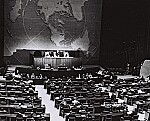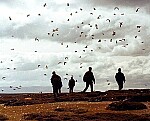May 2nd 2011: The day Osama Bin Laden was killed: A turning point in the War on Terror
On May 2, 2011, the world witnessed a significant event in the ongoing global fight against terrorism. Osama bin Laden, the founder and leader of al-Qaeda, the extremist group responsible for the September 11 attacks, was killed by U.S. Navy SEALs in a covert operation that marked a critical turning point in the nearly decade-long War on Terror.

Prelude to the Operation
Osama bin Laden had been the world's most wanted terrorist for nearly a decade. The search for bin Laden had spanned several countries and involved the work of thousands of military and intelligence personnel. The breakthrough came in August 2010 when the CIA tracked the courier who was a close confidant of bin Laden to a compound in Abbottabad, Pakistan.
The Abbottabad Compound
The compound where bin Laden was hiding was located less than a mile from the Pakistan Military Academy, raising questions about how bin Laden could have lived there undetected. The structure was custom-built to harbor high-value targets with walls up to 18 feet high topped with barbed wire, and very few windows facing the outside world.
Operation Neptune Spear
The operation, codenamed Neptune Spear, was carried out by a small team of Navy SEALs from the United States Naval Special Warfare Development Group, commonly known as SEAL Team Six. The operation was the culmination of years of intelligence gathering and several months of surveillance of the Abbottabad compound.
On the night of the operation, the SEALs were transported into Pakistan by two Black Hawk helicopters. One helicopter crashed due to a mechanical failure, but this did not deter the mission. The SEALs breached the compound walls and entered the building. They encountered bin Laden on the third floor, where he was killed in a firefight.
The World Reacts
President Barack Obama announced the successful operation in a late-night television address, stating that "justice has been done." The news of bin Laden's death sent waves across the globe, leading to mixed reactions. In the United States, there were scenes of jubilation with large crowds gathering at Ground Zero in New York and outside the White House to celebrate the news.
However, the operation also sparked debates over the legality and morality of the unilateral U.S. military action on Pakistani soil without the Pakistani government's prior knowledge. It raised concerns about sovereignty and the rules of international engagement.
The Aftermath and Legacy
The death of Osama bin Laden was seen as a symbolic and strategic blow to al-Qaeda. However, it did not mark the end of the terrorist threats posed by al-Qaeda and its affiliates. The organization proved resilient, adapting its tactics and continuing to inspire extremist actions around the world.
The killing of bin Laden also had significant implications for U.S.-Pakistan relations. It led to increased scrutiny and tensions due to the apparent hiding of bin Laden in a country that was supposed to be an ally in the War on Terror.
Conclusion
The day Osama bin Laden was killed stands as a landmark moment in modern history, reflecting the complexity of global counterterrorism efforts. It highlighted the challenges of addressing terrorism while respecting international laws and norms. While it brought closure to some, it also opened a new chapter of global security dynamics that continues to evolve today.








